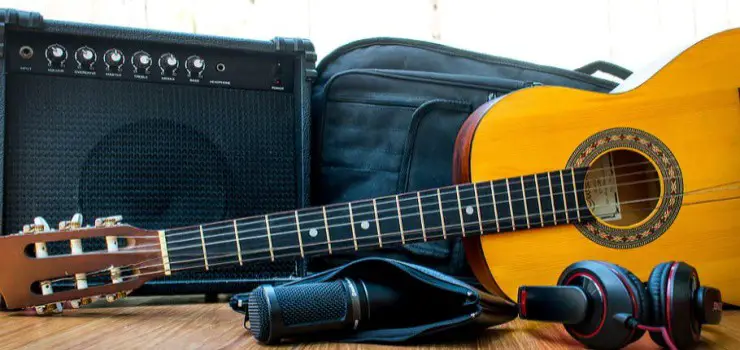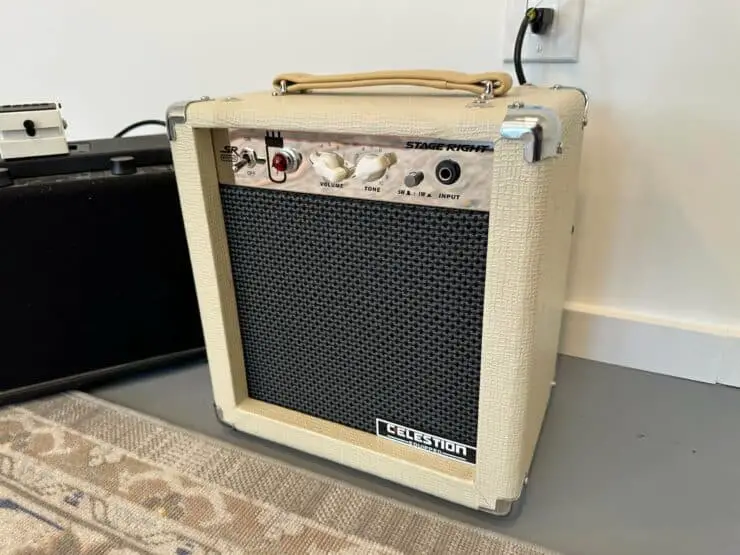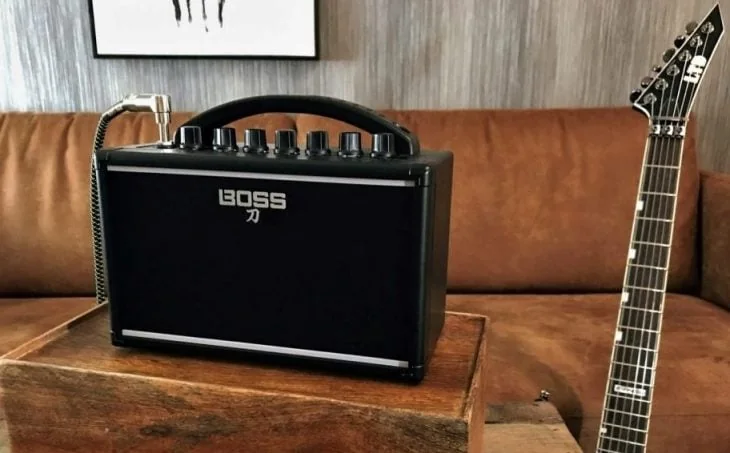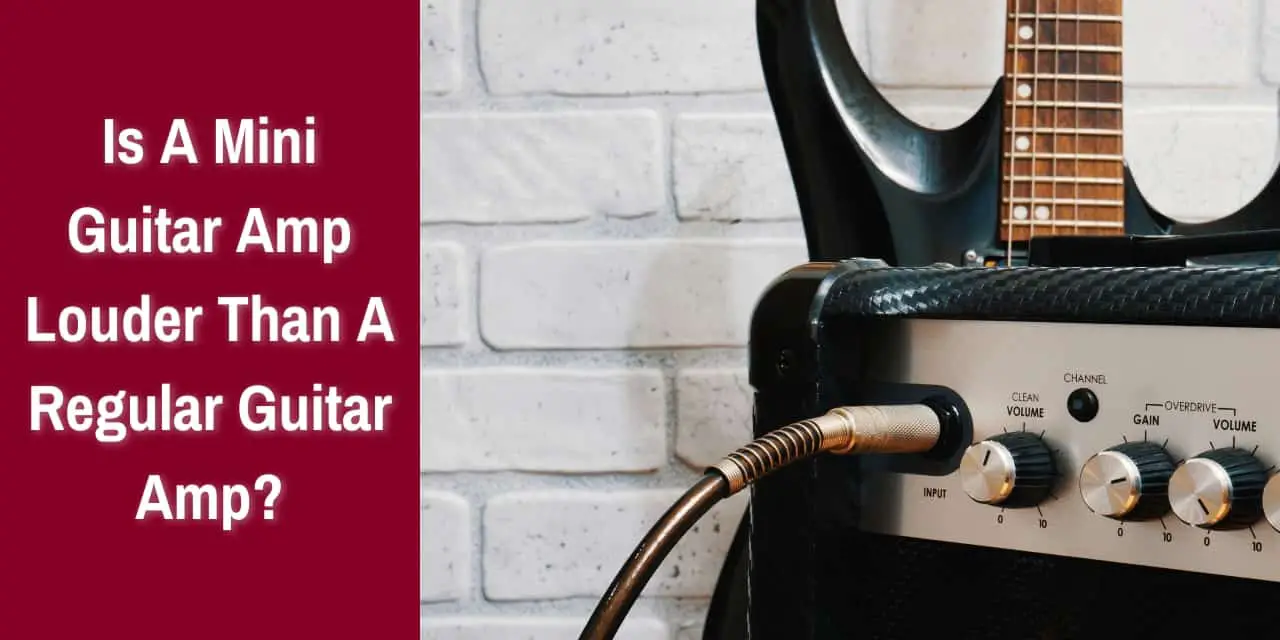If you are a guitar player, you know the importance of having a loud, clear sound when playing your instrument. But have you ever wondered if a mini guitar amp is actually louder than a regular guitar amp? In this article, we will explore the differences between mini and regular guitar amps and answer the question of which one is louder. Read on to find out if a mini guitar amp is actually louder than a regular one!
Mini guitar amps – An ideal option for different categories of musicians
Mini guitar amps have become an essential tool for musicians and guitarists looking for convenience and versatility in their musical journeys. As technology advances, these compact amps have evolved to deliver impressive sound quality and a range of features, making them an indispensable companion for musicians on the go.
Mini guitar amps are small, lightweight amps designed for portable use, practice, and casual performances. They are significantly smaller than standard guitar amps and often come in compact and sleek designs, making them easy to carry in a gig bag or backpack.
>>> Click here to read our review about the Top 15 Best Mini Guitar Amps <<<
Despite their diminutive size, these mini amps can produce impressive sound quality and a surprising amount of volume, which makes them suitable for practicing at home, jamming with friends, or even performing in intimate settings.
Musicians who have to practice or play at home often make use of mini guitar amps. It provides guitarists with a convenient practice tool. Whether you are a beginner learning the ropes or an experienced player honing your skills, these portable amps allow you to practice without disturbing others thanks to their headphone outputs. They often include various built-in effects like reverb, delay, and distortion, giving players the opportunity to experiment with different sounds and styles.
The compact size and lightweight nature of mini guitar amps make them perfect for musicians on the move. They can be taken easily to rehearsals, music lessons, and jam sessions, eliminating the need to rely on the venue’s amplification. Moreover, mini guitar amps often run on batteries or USB power, adding to their portability and eliminating the need for a power outlet, making them perfect for impromptu outdoor performances.
Mini guitar amps are also perfect for musicians who indulge in traveling and busking. For traveling musicians and buskers, mini guitar amps serve as a reliable companion. They provide ample power and sound quality for small public performances, allowing buskers to amplify their instruments and be heard in busy urban environments. Their portable design ensures that they fit snugly in a travel bag or guitar case, making them a favorite for touring musicians.
These amps are also popular for recording purposes, especially in home studios. They often feature direct output options that allow users to connect them directly to a recording interface or mixing console. With built-in amp modeling and effects, these amps provide a wide range of tones, saving time and space in the recording process.
Is a mini guitar amp louder than a regular guitar amp in terms of power rating?
When it comes to choosing the right amp, musicians are faced with a plethora of options, each offering different features and specifications. For beginners, a common question is – is a mini guitar amp louder than a regular guitar amp? It is determined by many different factors. An important factor that determines the loudness is the power rating.
Before diving into the answer, it is important to understand what power ratings mean in the context of guitar amps. The power rating of an amp is measured in watts (W) and refers to the amount of electrical power the amp can deliver to drive the speakers.
Higher wattage amps produce louder sound and are ideal for larger venues or band performances. Meanwhile, lower wattage amps are typically more suited for practice, home use, and smaller gigs. As mini guitar amps come with a lower power rating, so no, they aren’t louder than a regular guitar amp.

Power ratings of mini guitar amps
Mini guitar amps are characterized by their lower wattage, usually ranging from 1W to 20W. These portable and lightweight amps are designed for convenience and practice purposes. They are perfect for home use, allowing you to practice quietly with headphone outputs, making them perfect for late-night practice sessions without disturbing others.
Mini guitar amps are easy to carry, which makes them ideal for musicians on the go, buskers, and travelers. Their lower wattage and headphone outputs allow for silent practice sessions, making them ideal for beginners or those living in shared spaces.
However, due to their lower wattage, mini guitar amps might not be suitable for larger gigs or venues that require more significant sound projection. While many mini guitar amps come with built-in effects, they might not offer the same tonal versatility as higher-wattage amps.
Power ratings of regular guitar amps
Regular guitar amps or also known as stage amps come with a higher power wattage, ranging from 30W to several hundred watts. This makes them much louder than mini guitar amps. They are designed to handle larger venues, studio recordings, and band performances.
Regular guitar amps come with higher wattage, which provides more significant sound projection, making them suitable for live performances and band settings. Higher wattage amps often come with more features, controls, and effects, allowing musicians to achieve a wide range of tones.
They can be heavier and bulkier, making them less suited for musicians who need a portable solution for travel or busking. Due to their higher wattage, they might not be a practical option for quiet practice sessions in noise-sensitive environments.
The choice between mini guitar amps and regular guitar amps will ultimately depend on your specific needs and playing requirements. If silent practice and portability are important to you, a mini guitar amp with lower wattage may be a suitable option. Meanwhile, if you require higher volume and tonal versatility for studio recordings and live performances, a regular guitar amp with higher wattage would be more suitable.
Is a mini guitar amp louder than a regular guitar amp in terms of sound levels?
The sound level of a guitar amp plays a key role in defining your musical experience, whether you are practicing at home, performing on stage, or recording in the studio. Regular guitar amps are significantly louder than mini guitar amps in terms of sound levels. When choosing between mini guitar amps and regular guitar amps, it is important to consider how their sound levels differ and how they can impact your playing.
Sound levels of mini guitar amps
Mini guitar amps are characterized by their lower wattage, typically ranging from 1W to 20W. These portable and compact amps are ideal for practice sessions and small performances, providing the perfect balance of convenience and sound control.
Mini guitar amps excel in quiet practice environments, thanks to their lower wattage. They are perfect for late-night practice sessions or situations where they have to play without disturbing others in your living space. Many mini guitar amps also come equipped with headphone outputs, allowing for silent practice.
Mini guitar amps are well-suited for small venues, cafés, or acoustic performances where the sound projection requirements aren’t as high. They offer just enough volume to fill intimate spaces without overwhelming the audience.
Sound levels of regular guitar amps
Regular guitar amps or also known as standard amps typically come with higher wattage, ranging from 30W to several hundred watts. These amps are designed to deliver substantial sound projection, making them perfect for live performances and studio recordings.
Regular guitar amps shine in larger venues and band performances where higher sound projection is needed to reach a larger audience. They offer the power needed to cut through the mix and capture the attention of the crowd.
With their higher wattage, regular guitar amps can handle various genres and musical styles. From delicate jazz tones to heavy metal crunch, these amps provide the versatility needed for diverse performances.
They are often preferred for studio recordings due to their ability to deliver a range of tones and sound dynamics. They can be mic’d up and easily captured in a recording environment.

Factors that affect sound levels in mini guitar amps
Mini guitar amps are an important tool for musicians and guitarists who want portability and versatility without compromising on sound quality. While their smaller size may lead some to believe that they lack power, these compact amps can still pack a punch. The sound level and tonal versatility of mini guitar amps are influenced by several factors. Here are some of the common factors that affect sound levels in mini guitar amps and their impact on the sound levels and performance of mini guitar amps.
#1. Speaker size
The size of the speaker is an important factor influencing the sound level and projection of a mini guitar amp. Smaller speaker sizes, such as 6.5 inches or 8 inches are commonly found in mini guitar amps, as they contribute to the amp’s compact design.
While smaller speakers might not produce the same volume levels as large speakers found in regular guitar amps, they can still deliver impressive sound for practice and sound performances. Mini guitar amps with smaller speakers are better suited for home practice and intimate settings, where high volume levels might not be needed.
Smaller speakers can have a slight impact on the overall tonal response of the amp. They might emphasize certain frequencies, resulting in a distinct sound character. Some mini guitar amps might have multiple speakers or built-in tweeters, which can enhance the clarity and articulation of the sound.
#2. Tone controls
Tone controls play a crucial role in shaping the sound of a mini guitar amp. These controls typically include knobs for bass, midrange, and treble adjustments. Tone controls can affect the perceived volume level of the map.
For instance, boosting the midrange can make the amp sound louder and more present in the mix. Properly adjusting the tone controls allows you to find the sweet spot where the amp’s sound cuts through without being overwhelming.
Tone controls provide a wide range of tonal possibilities, allowing you to customize your sound to suit different playing styles and genres. The ability to fine-tune the amp’s EQ will allow for versatility in achieving various tones, from warm and mellow to bright and cutting.
#3. Effects
Many mini guitar amps come with built-in effects, such as reverb, delay, chorus, and overdrive. These effects can significantly impact the overall sound level and tonal versatility of the amp.
Effects can add depth and space to the sound, giving the illusion of a larger and more spacious sound stage. Certain effects, like distortion and overdrive, can boost the perceived volume, making the amp sound more powerful.
Built-in effects enhance the tonal versatility of the amp, allowing you to experiment with different sounds and textures. The ability to switch between different effects on the amp itself saves the need for additional pedals, making it a practical solution for guitarists looking for convenience.
#4. Connectivity
The connectivity options of mini guitar amps also contribute to the sound level of the amps. Common connectivity features include headphone outputs, line outputs, and external speaker outputs.
Headphone outputs enable silent practice, making them perfect for late-night or noise-sensitive environments. Line outputs will allow you to connect the amp directly to a recording interface or mixing console, ensuring consistent sound quality in a studio setting.
External speaker outputs allow you to connect the mini amp to a larger speaker cabinet, potentially increasing the sound level and enhancing the amp’s overall tone. Line outputs can be used for recording, providing a direct, uncolored signal to capture the amp’s natural sound.
Benefits of mini guitar amps
Music has the unique ability to captivate your senses, stir emotions, and provide an outlet for self-expression. For musicians and guitarists, having the right tools to enhance their playing experience is important. Mini guitar amps have emerged as an indispensable tool for musicians and guitarists of all levels as they offer a lot of benefits. Here are some of the primary benefits of mini guitar amps, displaying how they empower musicians and elevate their musical journeys to new heights.
#1. Convenience and portability
One of the most apparent benefits of mini guitar amps is their convenience and portability. Unlike traditional guitar amps, which can be bulky and heavy, mini guitar amps are designed to be compact and lightweight. This makes them quite easy to carry in a gig bag, backpack, or even on one hand, allowing you to take your music on the go.
Whether you are heading to a music lesson, jamming with friends, or performing in an intimate setting, the portability of mini guitar amps ensures you can have your music with you at all times.
#2. Practice anytime, anywhere
For musicians and guitarists who value consistent practice, mini guitar amps are a game-changer. With headphone outputs, these portable amps enable guitarists to practice silently, even in the late hours of the night or in noise-sensitive environments.
This feature is particularly beneficial for beginners who are building their skills and might not feel comfortable playing at full volume in shared living spaces. The ability to practice anytime, anywhere fosters discipline and growth as a musician, making it easier to incorporate daily practice into your routine.

#3. Versatile sound options
Mini guitar amps aren’t just about convenience, they also pack a punch when it comes to sound versatility. Many models come with built-in effects such as delay, reverb, overdrive, and distortion, giving players the ability to experiment with different tones and styles without having to invest in a plethora of individual pedals.
For musicians and guitarists who love exploring new sounds and experiment with different genres, these amps provide a vast range of possibilities.
#4. The perfect option for buskers and performers on the go
For traveling musicians and buskers, mini guitar amps are a reliable companion. They offer enough power and sound quality for small public performances, enabling buskers to amplify their instruments and capture the attention of passersby.
Moreover, many guitar amps are battery-powered or have the option to be powered using USB, eliminating the need to have access to a power outlet. This makes them perfect for outdoor performances and impromptu jam sessions.
#5. Recording and home studios
Mini guitar amps have found a place in home studios too. With direct output options and amp modeling features, these amps can be easily connected to recording interfaces or mixing consoles. This saves time and space, allowing musicians to record their guitar tracks with ease.
The versatility of mini guitar amps ensures they can be an essential tool for recording musicians, especially those who prioritize portability and simplicity in their setups.
Different types of mini guitar amps
When it comes to mini guitar amps, there is no shortage of options to choose from. Each type offers a unique set of features and characteristics that cater to different playing styles and preferences. Here are some of the different types of mini guitar amps. Understanding the strengths and differences of each type of mini amp will help you make a smarter decision and find the perfect match for your musical journey.
Tube amps
Tube amps or also known as valve amps are renowned for their warm, rich, and organic tone. They use vacuum tubes for amplifying the guitar signal, creating a unique tone that many guitarists cherish. Mini tube amps offer the iconic tube tone in a smaller and more portable format.
Tube amps produce harmonic overtones that add depth and character to the sound. The natural compression of tubes creates a dynamic response that is sensitive to your playing dynamics. Tube amps are favored for their warm and smooth tone, especially in clean and low to mid-gain settings. They excel in reproducing vintage tones associated with blues, jazz, and classic rock.
While mini tube guitar amps are more portable than their larger counterparts, they are still relatively heavier and bulkier compared to solid-state and digital modeling amps. The tube components might require careful handling when transporting the amp to avoid damage.
Solid-state amps
Solid-state amps utilize semiconductor electronics for amplifying the guitar signal. They offer a much more reliable and maintenance-free alternative to tube amps, making them a popular choice for players seeking consistency and durability.
Solid-state mini guitar amps are known for their clean, transparent sound, making them ideal for genres that require pristine and uncolored tones. These amps deliver a fast attack and response, making them suitable for high-gain tones and genres like heavy metal.
These types of amps are generally lighter and more compact than tube amps, making them easier to transport and ideal for musicians on the move. They are more robust and less susceptible to damage from rough handling during transportation.
Digital modeling amps
Digital modeling amps make use of advanced digital signal processing to emulate the sound of various amplifier types and effects. They offer a wide range of tonal possibilities and are a favorite among guitarists seeking versatility and convenience.
These types of amps can accurately replicate the sound of classic tube amps, solid-state amps, and more. They provide a vast selection of amp models and effects, allowing you to explore various tones and genres. Many digital modeling amps come with built-in effects, such as delay, reverb, modulation, and more. This eliminates the need for additional pedals and streamlines your setup.
Digital modeling amps vary in size and weight but they typically offer a good balance between portability and versatility. Some advanced modeling amps might have more features and controls, which could affect the overall size and weight.
FAQs
What is the difference between a mini guitar amp and a regular guitar amp?
Mini guitar amps are small and lightweight amps typically used for practice or for playing in small spaces. They often have lower wattage and smaller speakers compared to a regular guitar amp, but can still pack a punch. Regular guitar amps are usually much larger and heavier and are designed for performance, with higher wattage and larger speakers to provide more volume and projection.
Is a mini guitar amp louder than a regular guitar amp?
No, a mini guitar amp is typically not as loud as a regular guitar amp. Mini guitar amps have lower wattage and smaller speakers, so they are not typically able to achieve the same volume and projection as a regular guitar amp. However, mini guitar amps still provide plenty of volume and can be adequate for practice and small performances.
What are the benefits of using a mini guitar amp?
A: Mini guitar amps are great for practice, as they are compact, lightweight, and can be used in small spaces. They are also ideal for playing on the go, as they are easy to transport and set up. Mini guitar amps are also typically more affordable and require less maintenance than regular guitar amps.



